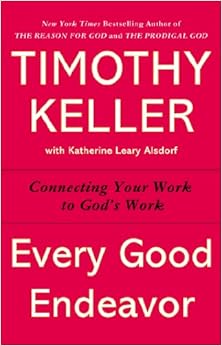[Part 3 of an adaptation of the “We are at Work” sermon at The District Church on May 17, 2015. Read Part 1 here and Part 2 here.]
 In their book Every Great Endeavor, Tim Keller and Katherine Leary Alsdorf list some common ways of understanding our Christian responsibility as those who work. You may know—or hold to—some of these:
In their book Every Great Endeavor, Tim Keller and Katherine Leary Alsdorf list some common ways of understanding our Christian responsibility as those who work. You may know—or hold to—some of these:
- to further social justice in the world;
- to be personally honest and evangelize your colleagues;
- just to do skillful, excellent work;
- to create beauty;
- to work from a Christian motivation to glorify God, seeking to engage and influence culture to that end;
- to work with a grateful, joyful, gospel-changed heart through all the ups and downs;
- to do whatever gives you the greatest joy and passion;
- to make as much money as you can, so that you can be as generous as you can.
The thing is, while some people will pick one or two of these and argue that this is what we’re all supposed to do, none of these is the only—or even the main—way; in fact, they’re intended—like the four chapters of the gospel story—to go together. They’re supposed to fill out a larger picture and understanding of our work. We’re supposed to try to do all of these things, and this vision of work is supposed to be bigger than anything you can manage on your own, because it’s God’s vision and that means it’s a God-sized vision. Don’t let our individualistic culture or American Christianity’s over-emphasis on your personal relationship with God fool you; knowing God personally is absolutely vital but God intended us to be a part of his family, part of his body, part of his church, to need each other and each other’s contribution and each other’s support, to depend on and value the other parts of the body of Christ even as we play our part. Why church? Because that’s what God made us for.
Let me close with a challenge and an encouragement. My challenge to you all is this—and it may seem frustratingly simple and vastly inadequate to answer all of your questions and issues about work, and that may be intentional: seek God. Wherever you are—whether you are in a job you (by-and-large) enjoy or in a job you don’t; whether you feel like you’re utilizing your gifts or not; whether you feel fulfilled or not, seek God. If your faith has nothing to do with your work, seek God. If you don’t even have a faith, seek God.
Seeking God may look like recognizing that you can’t do your job without God and allowing that to drive you deeper into dependence on God. Seeking God may look like realizing that God might be calling you out of the work you’re doing and into something new or it may look like staying where you are right now because God is trying to teach you patience and perseverance and graciousness toward others. Seeking God may be as seemingly-insignificant as just saying a prayer when you’re having a rough moment or a long day, or as seemingly-life-changing as switching careers even though you went to school or worked for many years to get where you are now. Seeking God is actually never insignificant.
Seeking God might mean getting your personal walk with God in order—in 2 Timothy 3:16-17, the Apostle Paul writes, “All Scripture is God-breathed and is useful for teaching, rebuking, correcting and training in righteousness, so that the servant of God may be thoroughly equipped for every good work.” Seeking God might mean getting more connected with the church community, who can support you in prayer, who can check in on you and see how you’re doing, who can take you out for a drink when you need it, who can remind you of the promises of God, or just be there, embodying the presence and love of God. “Seek God” is intended to be a simple challenge: simple in order that it might be applicable to all people in all situations and a challenge because it requires you to make an effort.
And here’s the encouragement—again, it may seem frustratingly simple and vastly inadequate to bring you much comfort, but again, that may be intentional: you’re not alone. This is where the church is unique—we are the body of Christ, we are dedicated to the work of God, and we are indwelled by the Most High. You’re not alone because God is with you. One of Jesus’ names was Emmanuel—it means “God with us.” I believe God says to us the same thing he said to Joshua in the Old Testament:
Have I not commanded you? Be strong and courageous. Do not be afraid; do not be discouraged, for the Lord your God will be with you wherever you go. (Joshua 1:9)
God sent his Son to walk among us and he sent his Spirit to live within us. God is with you—and actually that’s why it’s important to seek God, because in seeking God, you may realize that God is with you far more than you’ve ever been aware.
You’re also not alone because we are with you. We the church, we the body of Christ, we the children of God, we your brothers and sisters in the Lord. Throughout the church, there are others who could listen to your story, to your struggles, to your joys, and say, “Me too.” We stand with one another, we laugh with one another, we pray with one another, we care for one another, we share one another’s burdens, we work with one another and are with one another as we work (and as we look for work). And all for the glory of God.